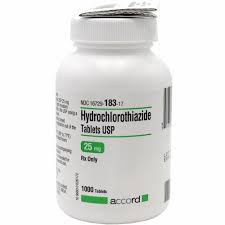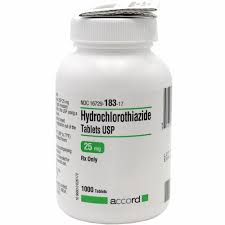Providing Quality & Trust || Clinic Website
Hydrochlorothiazide Tablets
Accord Healthcare Inc
$0.24 - $17.02
$0.24 Each
Detailed Description
Hydrochlorothiazide
(hye-droe-klor-oh-thye-a-zide)
- Description: Diuretic
- Other Names for this Medication: HydroDIURIL®
When beginning this medicine, your animal may urinate more often than normal.
May be given with or withoutfood. Allow access to fresh, clean water at all times; encourage normal food intake. If your animal vomits or acts sick after receiving the drug on an empty stomach, try giving the next dose with food or a small treat. If vomiting continues, contact your veterinarian.
Because this drug can change salt(electrolyte) levels in the blood, your veterinarian will wantto do more frequent blood tests while your animal is receiving this drug. Do not miss these importantfollow-up visits.
Contact your veterinarian immediately if excessive thirst, weakness, collapse (passing out), head tilt, lack of urination, or a racing heartbeatis noticed.
How is this medication useful?
Hydrochlorothiazide is a diuretic that works in the kidneys to remove excess fluid (water) and saltfrom the body. It is used in small animals to treat high blood pressure, heartfailure, calcium-containing kidney or bladder stones, and a rare condition called nephrogenic diabetes insipidus (not diabetes mellitus or sugar diabetes).
In horses, hydrochlorothiazide may be used to treat a condition called hyperkalemic periodic paralysis (HYPP) as it can help reduce the amount of potassium in the blood. The FDA has approved this drug for use in humans but it is not officially approved for use in animals. You and your veterinarian can discuss why this drug is the most appropriate choice.
- Thiazide diuretic used for nephrogenic diabetes insipidus, hypertension, calcium oxalate urolith prevention, hypoglycemia, & as a diuretic for heart failure.
- Contraindications: Hypersensitivity; pregnancy (relative contraindication).
- Extreme caution/Avoid: Severe renal disease, preexisting electrolyte & water balance abnormalities, impaired hepatic function, hyperuricemia, SLE, diabetes mellitus.
- Adverse effects: Hypokalemia, hypochloremic alkalosis, other electrolyte imbalances, hyperuricemia, GI effects.
- Many possible drug interactions; lab test interactions.
Uses/Indications:
In veterinary medicine, furosemide has largely supplanted the use of thiazides as a general diuretic. Thiazides are still used for treatment of systemic hypertension, ascites, hypermagnesemia, nephrogenic diabetes insipidus, and to help prevent recurrence of calcium oxalate uroliths in dogs, and potentially in cats. In horses, hydrochlorothiazide may be used as an alternative to acetazolamide for hyperkalemic periodic paralysis (HyPP) when dietary therapy alone does not control episodes.
Side Effects:
Common, but not serious side effects include:
- Increased need to urinate. The greater need to urinate may cause some animals to act restless. Be sure to allow your animal the chance to urinate more often, especially when starting this drug or when doses are increased. Vomiting or diarrhea is possible.
You don’t have to be overly concerned if you see any of these signs unless they are severe, worsen, or continue to be a problem. Contact your veterinarian if this happens.
If you have any other questions about this medication, contact your veterinarian or pharmacist.
Dosages:
- DOGS:
Prevention of recurrent calcium oxalate uroliths with renal hypercalcuria: (extra-label): Usually added when dietary therapy does not adequately control calcium oxalate crystalluria. Most recommend 2 – 2.2 mg/kg PO every 12 hours. Although an upper dosage limit of 4 mg/kg PO every 12 hours has been noted.
Diuretic agent (extra-label):
Adjunctive treatment of heart failure when patients become refractory to furosemide alone: Several dosage regimens have been recommended, but evidence is weak supporting any specific one. Recommendations include starting doses of 1 – 2 mg/kg PO every 12-24 hours, titrating to 4 mg/kg PO every 12 hours as required. Some use with spironolactone, particularly if hypokalemia is an issue.
Ascites in patients with liver disease using the fixed-dose (1:1) combination with spironolactone (aka Aldactazide®): Dosed empirically based on the spironolactone content at 0.5 – 1 mg/kg PO every 12 hours.
Systemic hypertension (extra-label): As a second choice agent, hydrochlorothiazide 1 mg/kg PO every 12-24 hours; may combine with spironolactone 1 – 2 mg/kg PO every 12 hours to reduce potassium loss.
Nephrogenic diabetes insipidus (extra-label): Based on a case report, hydrochlorothiazide 2 mg/kg PO every 12 hours with a low sodium diet.
Malignancy-associated hypoglycemia (extra-label): 2 – 4 mg/kg PO every 24 hours in conjunction with diazoxide 5 – 20 mg/kg every 12 hours.
- CATS:
Diuretic agent (extra-label): Heart failure in combination with furosemide in patients who have become refractory to furosemide alone: hydrochlorothiazide 1 – 2 mg/kg PO every 12 hours.
For ascites in patients with liver disease using the fixed-dose (1:1) combination with spironolactone (aka Aldactazide®): Dosed empirically based on the spironolactone content at 0.5 – 1 mg/kg PO every 12 hours. Reduce calcium oxalate saturation in urine (extra-label): Study done in normal cats, unknown what effect hydrochlorothiazide will have in cats with spontaneously occurring calcium oxalate urolithiasis: 1 mg/kg PO every 12 hours.
Nephrogenic diabetes insipidus (extra-label): 12.5 – 25 mg per cat (not mg/kg) PO every 12-24 hours.
Central diabetes insipidus (extra-label): 12.5 mg per cat PO every 12 hours.
- HORSES: (NOTE: ARCI UCGFS Class 4 Drug)
Adjunctive therapy of hyperkalemic periodic paralysis (HyPP); (extra-label): ): 0.5 – 1 mg/kg PO every 12 hours when diet adjustment does not control episodes.
Precautions/Warnings:
Hydrochlorothiazide is contraindicated in patients with anuria or hypersensitive to any thiazide. Although many sources state that thiazides are contraindicated in patients hypersensitive to sulfonamides, clear evidence for cross-reactivity has not been established in humans or animals. In humans, their use is inappropriate during pregnancy in women who are otherwise healthy and have only mild edema.
Do not use in dogs with absorptive (intestinal) hypercalcuria as hypercalcemia may result.
Thiazides should be used with extreme caution, if at all, in patients with severe renal disease or with preexisting electrolyte (including hypercalcemia) or water balance abnormalities, impaired hepatic function (may precipitate hepatic coma), hyperuricemia, lupus (SLE), or diabetes mellitus. Patients with conditions that may lead to electrolyte or water balance abnormalities (e.g., vomiting, diarrhea, etc.) should be monitored carefully.
Powered by nopCommerce
This site is running in live payment mode. Real payments will be processed.

